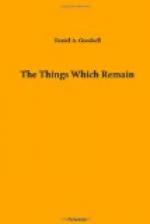[Sidenote: Immortality of Force.]
[Sidenote: Christ’s Light.]
[Sidenote: The Christian’s Eye.]
Once more let Huxley speak as to the scientific possibility “with regard to the other great Christian dogmas, the immortality of the soul, and a future state of rewards and punishments, what possible objection can I, who am compelled, perforce, to believe in the immortality of what we call matter and force, and in a very unmistakable present state of rewards and punishments for all our deeds, have to these doctrines? Give me a scintilla of evidence, and I am ready to jump at them."[9] But when all conditions are considered, and just weight given to all the probabilities, the full persuasion of immortality comes through Him who has “brought life and immortality to light.” These seem part of His communication to the souls in whom He dwells. To them He says, “Because I live, ye shall live also.” Into their being He injects the power of an endless life. Their hopes, faith, affections center less and less on time. The truer, fuller, richer life is felt to be coming. It is to surpass the earthly life in quantity and in quality only because the soul, as it flutters Godward, must here feel the attrition of its fleshly tabernacle. This dissolved, the fullness and the freedom come. The house not made with hands henceforth enshrines the spirit. Christ’s great Word is finally interpreted: “I am come, that they might have life, and have it more abundantly.”
[Footnote 9: Biography. Vol. I, p. 260.]
* * * * *
[Sidenote: The Life Everlasting.]
[Sidenote: Literalism.]




